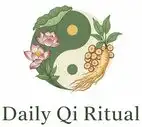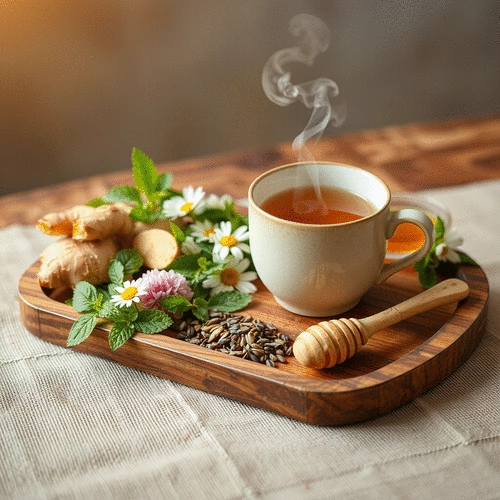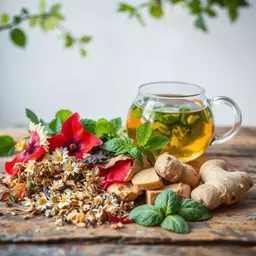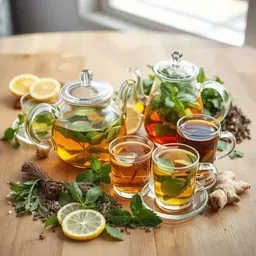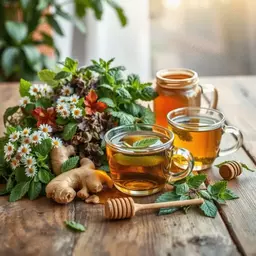Did you know that the balance of energy flow in your body can directly affect your digestion? In Traditional Chinese Medicine (TCM), the right herbal teas can play a vital role in supporting digestive health and overall well-being. Here’s how you can harness the power of these natural remedies!
What You Will Learn
- Understanding the role of qi flow in digestion and overall health in TCM.
- The benefits of herbal teas, including relief from bloating, stomach pain, and enhancing nutrient absorption.
- Key herbal ingredients such as ginger, peppermint, and dandelion that support digestive health.
- Seasonal recommendations for herbal teas that align with your body's digestive needs throughout the year.
- How to integrate TCM herbal teas into your modern wellness routine for optimal digestive health.
- The impact of combining herbal teas with digestive enhancers like enzymes for improved gut health.
Herbal Teas for Digestive Health
The following herbal teas offer various benefits for digestive health, highlighting their key features. For a deeper dive into the world of TCM herbs and their benefits, consider exploring herbal teas in Traditional Chinese Medicine.
Ginger Tea
Promotes digestion and alleviates indigestion.
- Warming properties
- Stimulates qi flow
Peppermint Tea
Soothes stomach discomfort and alleviates gas and bloating.
- Calming effect
- Relieves cramps
Chamomile Tea
Calms the digestive system and reduces spasms.
- Promotes relaxation
- Enhances digestion
Dandelion Tea
Supports liver health and aids digestion.
- Promotes bowel function
- Detoxifying properties
Herbal Tea Recipes for Enhanced Digestive Health in TCM
Understanding Traditional Chinese Medicine and Digestion
In Traditional Chinese Medicine (TCM), digestion is seen as a vital process that relies on the balance of qi (energy) flow, as well as the warming and cooling properties of various herbs. When our spleen and stomach are functioning well, we experience good digestion, better energy, and overall health. However, when there is a disruption in this balance, it can lead to discomfort, bloating, or even fatigue.
Herbs play a significant role in harmonizing our digestive system. For instance, warming herbs can enhance qi flow, while cooling herbs can help to soothe inflammation. Have you ever thought about how what you drink can impact your digestive health? By choosing the right herbal teas, you can tap into the wisdom of TCM and support your body's natural rhythms.
Benefits of Herbal Teas for Digestive Health
Herbal teas are not only comforting but also packed with benefits for digestive health. They can help alleviate common issues such as bloating, stomach pain, and even indigestion. Imagine sipping a warm cup of ginger tea and feeling your discomfort melt away—it’s a simple yet effective remedy!
In addition to digestive support, herbal teas can offer extra health benefits. Many herbal ingredients contain anti-inflammatory properties, which can strengthen your immune system. Here are some benefits of incorporating herbal teas into your daily routine:
- Soothing digestive discomfort
- Enhancing nutrient absorption
- Supporting overall gut health
- Promoting relaxation and stress relief
Key Herbal Ingredients for Digestive Teas
Ginger Tea: A Warming Remedy for Indigestion
Ginger is a star player in TCM for its warming properties that promote digestion. It helps stimulate the stomach and improve the flow of qi. To prepare ginger tea, simply slice fresh ginger and steep it in hot water for about 10 minutes. You can spice it up with a bit of honey or lemon for added flavor!
Here are some variations to try with ginger tea:
- Add a sprinkle of cinnamon for extra warmth.
- Mix with turmeric for an anti-inflammatory boost.
- Combine with green tea for a refreshing twist.
Peppermint and Licorice: Soothing Blends for Digestive Comfort
Peppermint is well-known for its ability to soothe the stomach, while licorice root adds a touch of sweetness and balances the digestive system. This delightful combination can help calm your tummy and make you feel at ease after meals. To prepare, steep peppermint leaves and licorice root together for about 8-10 minutes. For more on preparing these beneficial beverages, see our guide on brewing traditional Chinese herbal teas.
Here are some benefits of this soothing blend:
- Alleviates gas and bloating
- Relieves stomach cramps
- Supports a healthy gut environment
Hawthorn Berry and Dandelion: Detoxifying Herbal Teas
Hawthorn berry is a fantastic herb in TCM known for its ability to support digestion and detoxify the body. Dandelion, often seen as a weed, is actually a powerful ingredient that promotes liver health. Combining these herbs creates a delicious detox tea. Simply steep hawthorn berries and dandelion root together and enjoy the benefits!
Chamomile and Fennel: Calming Herbal Teas for Digestive Relief
Chamomile is renowned for its calming effects, making it perfect for those tense moments when digestion feels off. Fennel, on the other hand, is a digestive hero that can help reduce bloating and gas. To prepare, steep equal parts chamomile flowers and fennel seeds in hot water for approximately 5-7 minutes.
Consider these benefits of chamomile and fennel:
- Promotes relaxation
- Reduces digestive spasms
- Enhances overall digestive function
Chrysanthemum and Tangerine Peel: Refreshing Digestive Aids
Chrysanthemum offers calming effects and is an excellent herb for soothing digestive distress, while tangerine peel adds a refreshing citrus note that invigorates the senses. Steep dried chrysanthemum flowers and tangerine peel together for a delightful and aromatic tea.
Here are some benefits of this refreshing blend:
- Supports liver and spleen function
- Promotes detoxification
- Enhances hydration and well-being
Pro Tip
For maximum benefits, consider preparing your herbal teas with fresh ingredients rather than dried ones. Fresh herbs retain more essential oils and nutrients, which can enhance the flavor and healing properties of your tea. Additionally, allow your tea to steep longer to extract the full range of benefits from the herbs, especially when using tougher roots like ginger or dandelion.
Seasonal Recommendations for Herbal Teas
As the seasons change, so do our bodies' needs, especially when it comes to digestion. At Daily Qi Ritual, we celebrate the beauty of nature’s cycles by recommending herbal teas that align with the energy of each season. This way, you can support your digestive health while enjoying the unique flavors and benefits of seasonal herbs!
In spring and summer, it’s all about lightness and refreshment. Picture yourself sipping on a cool glass of herbal tea, infused with fresh flavors that help your body adapt to warmer weather. Are you ready to explore the best herbal teas for these lively seasons?
Best Herbal Teas for Spring and Summer Digestion
Spring and summer are fantastic times to embrace herbal teas that support digestion while keeping you cool. Here are some great options to consider:
- Mint Tea: Naturally cooling and soothing for the stomach, perfect for alleviating any bloating after meals.
- Hibiscus Tea: A refreshing blend that not only tastes great but also aids digestion and supports your cardiovascular health.
- Chrysanthemum Tea: This floral tea is known for its cooling properties and can assist with heat-related digestive discomfort.
- Lemon Balm Tea: Offers a light, citrusy flavor that enhances digestion and promotes relaxation.
Integrating these teas into your daily routine can enhance your well-being and keep your digestive system in harmony with the vibrant energy of spring and summer. Imagine the soothing aroma filling your home as you brew a refreshing cup!
Year-Round Herbal Tea Blends for Digestive Support
No matter the season, certain herbal blends are always beneficial for digestive health. Here are some tried-and-true options that you can enjoy any time of the year:
- Ginger and Lemongrass Blend: A warm mix that stimulates digestion and wards off any discomfort.
- Chamomile and Fennel Fusion: This calming blend is excellent for easing tummy troubles and promoting relaxation.
- Hawthorn and Dandelion Brew: A powerhouse combination for detoxifying and supporting liver health.
- Licorice and Peppermint Duo: This delightful mix soothes the stomach and adds a touch of sweetness to your tea.
These herbal blends can become your trusted allies in maintaining digestive health throughout the year. I personally love having a ginger and lemongrass blend during a chilly evening; it warms me up while supporting my digestion! For more on how to incorporate these practices into your daily life, consider exploring incorporating TCM into daily life.
FAQs About Herbal Teas and Digestion in TCM
Now that we've explored seasonal herbal teas, let's dive into some common questions regarding how these remedies can aid digestion!
What is the role of "qi" in digestion according to TCM?
In TCM, "qi" refers to the vital energy that flows throughout the body. A balanced flow of qi is essential for proper digestion, ensuring that the spleen and stomach function optimally to process food and absorb nutrients. Disruptions in qi flow can lead to digestive discomfort.
How can herbal teas alleviate common digestive issues like bloating and indigestion?
Herbal teas work by leveraging the specific properties of herbs. For example, peppermint tea can relax digestive muscles and reduce bloating, while ginger tea stimulates digestion and soothes indigestion with its warming properties. Chamomile helps calm the digestive system and reduce spasms.
Are there specific herbal teas recommended for different seasons?
Yes, TCM emphasizes aligning with nature's cycles. In spring and summer, cooling and refreshing teas like mint, hibiscus, chrysanthemum, and lemon balm are recommended to support digestion in warmer weather. Year-round blends like ginger and lemongrass or chamomile and fennel are also beneficial.
Can I combine herbal teas with digestive enzymes for better gut health?
Yes, combining certain herbal teas with digestive enzymes can further enhance gut health. Examples include burdock root with ginger to boost digestion, slippery elm with fennel for soothing the digestive tract, and marshmallow root with licorice to protect the stomach lining.
How can I integrate TCM herbal teas into my modern wellness routine?
You can easily integrate TCM herbal teas by starting your day with a warming tea like ginger, enjoying a refreshing mint tea in the afternoon, or winding down with a calming chamomile tea in the evening. Experiment with different blends to find what best suits your taste and digestive needs, making it a mindful ritual.
Common Digestive Issues and Herbal Tea Solutions
Many people struggle with digestive issues at some point. Here’s a quick guide on how specific herbal teas can help:
- Bloating: Try peppermint tea to relax the digestive muscles.
- Indigestion: Ginger tea can stimulate digestion and soothe your stomach.
- Heartburn: Licorice root tea can help reduce acidity.
- Constipation: Dandelion tea promotes healthy bowel function.
These teas can be easily added to your routine to support your digestive health. It’s all about finding what works best for your unique body! To learn more about holistic approaches to health, you might find our article on understanding acupuncture: what to expect insightful.
Integrating TCM Herbal Teas into Modern Wellness Routines
At Daily Qi Ritual, we believe that incorporating TCM herbal teas into your daily life should be both enjoyable and beneficial. Here are some simple ways to do just that:
- Start your day with a warm cup of ginger tea to kickstart your digestion.
- Enjoy a refreshing mint tea in the afternoon to stay cool and focused.
- Wind down with chamomile tea in the evening to relax your mind and body.
- Experiment with different herbal blends and find what resonates with your taste and needs!
Creating a mindful tea ritual can be a delightful part of your wellness journey. How about setting aside a few moments each day to enjoy your herbal tea?
Using Digestive Enhancers: Enzymes and Herbal Combinations
Enhancing digestion can be taken a step further by combining herbal teas with digestive enzymes. Consider these effective combinations:
- Burdock Root with Ginger: This duo boosts digestion and promotes gut health.
- Slippery Elm with Fennel: Great for soothing the digestive tract.
- Marshmallow Root with Licorice: This combination offers a protective layer for your stomach lining.
Incorporating these combinations can elevate your digestive health routine. Remember, your journey is about balance and finding what feels best for you! For a broader perspective on maintaining overall well-being, explore herbal teas for daily wellness.
Summarizing Herbal Tea Benefits for Digestive Health
To wrap up, herbal teas play a significant role in supporting digestive health through the principles of TCM. By being mindful of seasonal changes and integrating these soothing remedies into your life, you can promote balance and harmony in your body.
Call to Action: Start Brewing Your Digestive Teas Today
Are you ready to embark on your journey towards better digestive health? I encourage you to try the recipes shared, explore new flavors, and listen to your body’s needs. Share your experiences with us at Daily Qi Ritual and discover the joy of herbal remedies for your well-being!
Recap of Key Points
Here is a quick recap of the important points discussed in the article:
- Understand TCM and Digestion: Digestion is vital for overall health, relying on the balance of qi and the properties of herbs.
- Benefits of Herbal Teas: Herbal teas can soothe digestive discomfort, enhance nutrient absorption, and promote relaxation.
- Key Ingredients: Ginger, peppermint, licorice, hawthorn berry, dandelion, chamomile, and fennel are all effective herbs for digestive support.
- Seasonal Recommendations: Choose light and refreshing teas like mint and hibiscus in warmer months to support digestion.
- Year-Round Blends: Ginger, chamomile, and licorice blends are beneficial regardless of the season.
- Incorporating Teas into Daily Life: Enjoy herbal teas at different times of the day to enhance your wellness routine.
- Digestive Enhancers: Combining herbal teas with digestive enzymes can further improve gut health.
